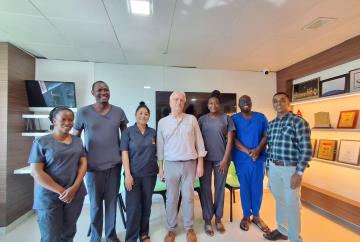Training of health professionals from Nigeria ed Uganda

Training African health workers is critical to addressing the continent's health challenges and improving overall well-being. In particular, Cure2Children wants to improve access to treatment for sickle cell anemia, the most common fatal non-infectious disease affecting children living in sub-Saharan Africa.
Effective training programs should focus not only on medical knowledge but also on cultural sensitivity and community involvement. Understanding local customs, beliefs and healthcare practices is essential to building trust and providing effective care.
Furthermore, training initiatives should be accessible and adapted to the specific needs of different regions of Africa. This could involve partnerships between local institutions, international organizations and governments to develop curricula, provide resources and offer mentorship opportunities.
By investing in the training and development of health workers in Africa, countries can strengthen their health systems, reduce dependency on foreign aid and ultimately improve health outcomes for their populations. Furthermore, empowering local professionals contributes to sustainable development by retaining talent within the continent and promoting a sense of ownership and responsibility for health issues. Through collaborative efforts and strategic investments in education and training, Africa can build a healthier future for all its citizens.
At our partner center in Bangalore-India, see virtual tour, and in collaboration with DKMS.Germania, we hosted doctors and nurses from Nigeria and Uganda, where the prevalence of sickle cell anemia in children is particularly high, estimated to be in the order of over 100,000 children.
